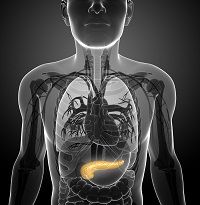Article
Severe Pancreatic Dysfunction Increases Risk of Developing Diabetes
Author(s):
New research on the link between diabetes and pancreatitis has shown a strong association between the severity of pancreatic dysfunction and subsequent risk of developing type 2 diabetes mellitus.

New research on the link between diabetes and pancreatitis finds a strong association between the severity of pancreatic dysfunction and subsequent risk of developing type 2 diabetes mellitus (T2DM).
A retrospective study of 127 of the 162 patients who came to the University of Pittsburgh Medical Center from 2003 to 2010 with an initial attack of acute pancreatitis collected follow-up data for a median period of 53 months.
The study team looked for either of 2 results, endocrine pancreatic insufficiency demonstrated by a diagnosis of diabetes or exocrine insufficiency identified by the patient’s use of oral pancreatic enzyme supplements. Medical records were also reviewed for factors that could help explain outcomes, factors such as patient demographics, etiology, the severity of incident attack and any subsequent pancreatitis.
Among the 127 patients, 36 already had diabetes when they came in with pancreatitis and another 73 never developed T2DM during the study period. The final 28 did develop T2DM — 19 during the initial admission that began the study and 9 at some point during the follow-up period.
When the investigators looked for factors that separated those patients who developed diabetes immediately from those who did not, they noticed that T2DM was always preceded by a truly serious case of pancreatitis. All of the patients who developed diabetes during their initial hospitalization first suffered either organ failure or pancreatic necrosis. The mean duration of their hospital visits was 31 days. Even those patients who developed diabetes during the follow-up period tended to start with more severe pancreatitis than those who did not. Other factors that the researchers looked at, such as body mass index, did not predict future illness.
“While parenchymal destruction from moderate-severe acute pancreatitis may explain the development of new-onset diabetes after acute pancreatitis, other mechanisms are likely important in the remaining patients,” wrote the study authors, who presented their findings at the most recent scientific sessions of the American College of Gastroenterology. “Further studies are needed to identify these patients earlier and to define the mechanisms for development of new-onset diabetes after acute pancreatitis.”
T2DM was actually a more common outcome of the initial acute pancreatitis suffered by study group members than exocrine pancreatic insufficiency. Only 11 patients (9%) received pancreatic enzymes — 5 after undergoing pancreatic surgery or debridement and 6 after developing symptoms during the initial hospitalization or follow-up.
The members of the study group, which was 48% male, had a mean age of 53.4 years at baseline. The most common cause of acute pancreatitis among group members was biliary (46%), followed by alcohol, endoscopic retrograde cholangiopancreatography and idiopathic onset.
The study team from Pittsburgh tracked patients to see if they developed diabetes or exocrine pancreatic insufficiency, but people who develop the first condition actually face a significantly elevated risk of developing the second. The association between diabetes and exocrine pancreatic insufficiency was first spotted in the 1960s, but only in more recent years, with the invention of non-invasive tests for endocrine pancreatic insufficiency and the explosion of diabetes research, has it become well documented.




